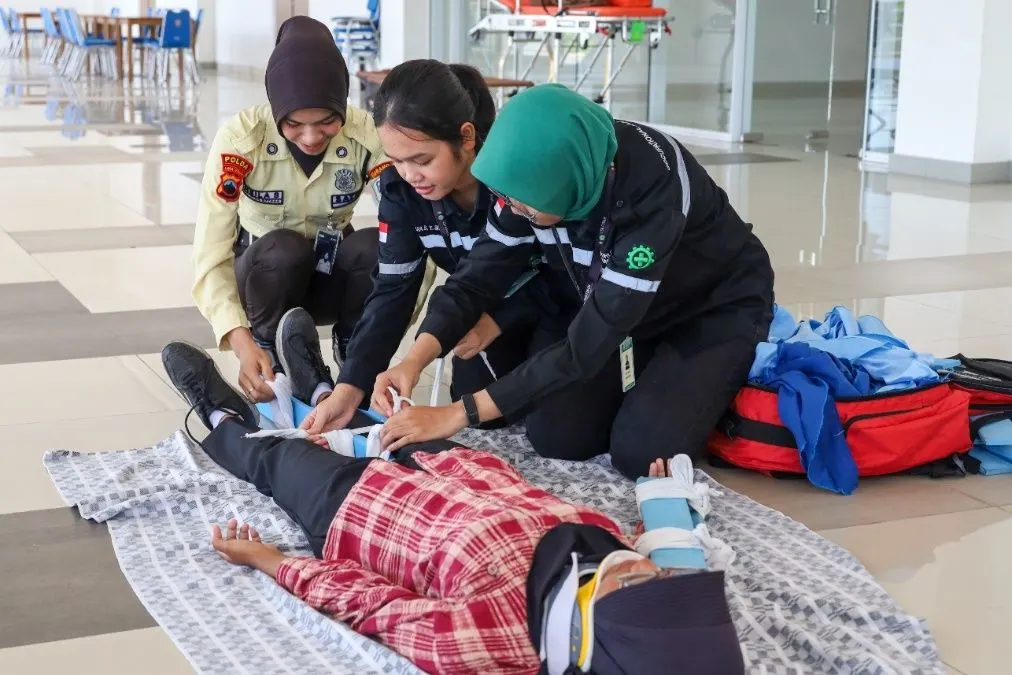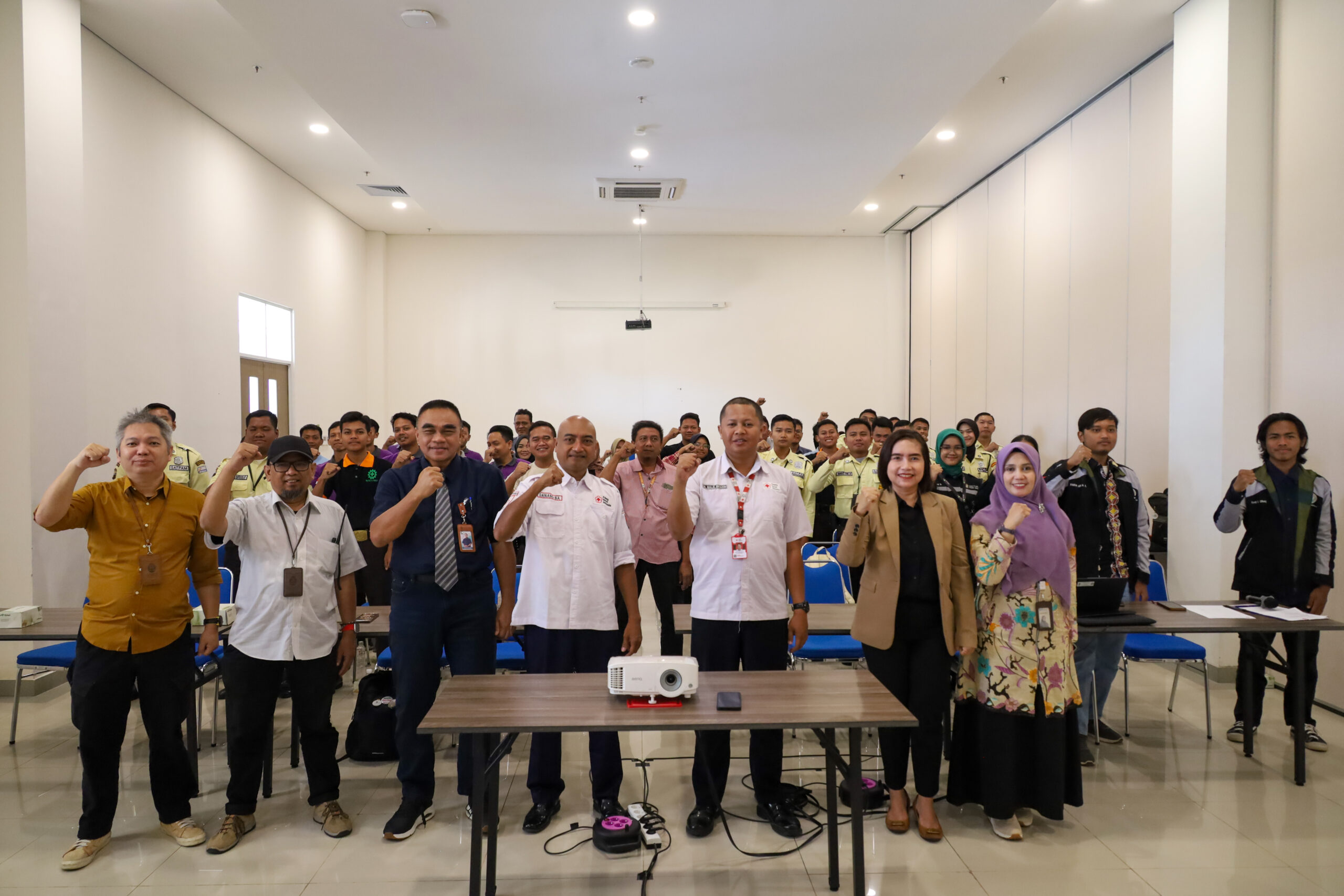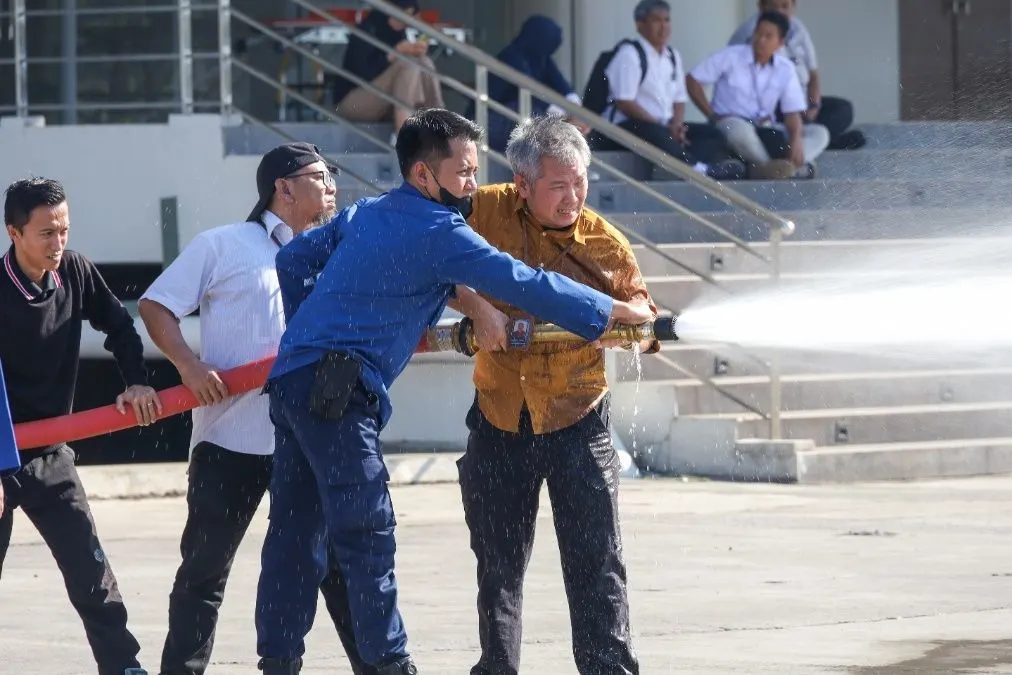UNDIP, Semarang (July 22, 2025) – Universitas Diponegoro (UNDIP) reaffirmed its commitment to cultivating a strong culture of workplace safety by organizing an earthquake and fire disaster preparedness simulation. The event, held on Monday, July 21, 2025, at the Muladi Dome multipurpose building, was coordinated by the Occupational Health, Safety, and Environment Unit (K3L) in collaboration with the Commercial Business Management and Risk Analysis Agency (BP UBIKAR).
The simulation involved 56 participants, including building managers, janitorial staff, security personnel, and parking attendants—the program aimed to train for rapid emergency response and improve technical capacity in managing potential disasters.
Dr. Andriyani, S.E., M.M., Head of BP UBIKAR UNDIP, officially opened the event on behalf of the Vice Rector for Planning, Finance, Assets, Business, and Operations. In her remarks, she praised the cross-unit collaboration that contributed to the development of an integrated campus risk management system.
“I appreciate everyone here for their willingness to learn how to save themselves and others. Preparedness isn’t just a technical duty—it’s a critical part of our systematic and sustainable approach to campus risk governance,” Dr. Andriyani said.
Dr. Andriyani also stressed the importance of maintaining Muladi Dome’s performance as a modern facility not only in its physical features but also in its safety systems. “This building is insured and equipped with fire protection systems. It’s only appropriate that its management focuses not only on commercial value but also on the safety and comfort of its users,” she added.
Echoing this, Dr. Bina Kurniawan, S.KM., M.Kes., Head of UPT K3L UNDIP, noted that simulations like this are part of an ongoing effort to create a safe and disaster-ready campus environment.
“Muladi Dome is one of UNDIP’s iconic public facilities. We must protect it—not just physically, but also by being prepared for emergencies. When something happens, at the very least we must be able to respond effectively to prevent further damage,” he stated.
Dr. Bina expressed hope that the training would inspire participants to become more alert and responsive to potential risks. “We hope participants won’t stop at just understanding the theory, but will routinely apply safety SOPs in real-time, effectively and accurately, during emergencies,” he emphasized.

The simulation continued with technical presentations and hands-on training led by experts from the Indonesian Red Cross (PMI) Semarang and the Semarang City Fire Department.
The PMI team, consisting of Danang Baskhoro Adhi, dr. R.P. Uva Utomo, MH, Sp.KF, and Maulana Malik Ibrahim, conducted sessions on first aid (P3K), early casualty assessment techniques (ABC – Airway, Breathing, Circulation), CPR (Cardiopulmonary Resuscitation), and evacuation methods for unconscious and choking victims (Heimlich Maneuver).
“The core principle of first aid is to save lives, prevent disability, and provide victims with a sense of security,” Danang explained.
In the ballroom and basement areas, participants engaged in emergency evacuation drills simulating earthquake and fire scenarios.
Meanwhile, the Semarang Fire Department team, led by Drs. Joko Santosa, R. Kelvin Adirahmat Putera, and Sofyan Syarifudin provided training on fire protection equipment maintenance and inspection, as well as hands-on practice using fire extinguishers (APAR) and hydrants for open fire suppression.
Participants were also introduced to various fire classes (A, B, and C), as well as the appropriate extinguishing agents and emergency tools, including fire blankets. They were given opportunities to practice using APARs and hydrants directly.
“No matter how expensive the equipment, it’s useless if the operator isn’t trained. Today, we’re not just training technical skills—we’re also building courage and precision,” Sofyan said.
The simulation concluded with a general evaluation and reflection session led by the Head of UPT K3L. Participants expressed positive feedback and renewed their commitment to maintaining safety in their daily operations.
Through this initiative, UNDIP aims to position Muladi Dome as a model of a resilient, professionally managed public building, equipped to respond systematically and effectively to any emergency. (Public Communication/ UNDIP/ DHW)











